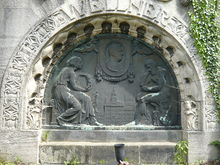Carl August Wellner
Carl August Wellner (born May 2, 1824 in Aue ; † May 25, 1909 there) was a Saxon manufacturer and entrepreneur . In 1857 he inherited the Argentanfabrik, which was founded in 1840, from his father Christian Gottlieb Wellner , and in the following years expanded it into a major company whose best-known products were cutlery . At the end of the 19th century, his sons joined the company as co-owners, which was now called Sächsische Metallwarenfabrik August Wellner Sons . Wellner had a major impact on the city's industrial development.
Life
Together with six siblings, including one brother, Carl (later also spelled Karl) August grew up in the family of the entrepreneur Christian Gottlieb Wellner , whose father worked in Bermsgrün as a forest and miner and had moved to Aue in 1810. After attending school in Aue, Carl August completed an apprenticeship as a carpenter and was able to acquire a master craftsman's certificate in 1854. Due to the early death of his father, Carl inherited part of the Argentanfabrik and successfully continued it from 1858 after three years of wandering. Karl August acquired special knowledge about the production of argentan and its further processing into sheet metal and end products by visiting the Henninger nickel silver factory in Berlin .
In his factory, he made sure that the latest production methods were always introduced. For example, he had eccentric screw presses as well as grading and oval lathes purchased. On the courtyard side, Carl August Wellner acquired 6000 square meters of meadow land in 1883.
In 1892 Wellner handed over the factory to his children Ernst Albin, Paul and Ida Marie, but kept the management until 1895.
After Carl August Wellner died in 1909, he was buried in the family crypt in the St. Nicolai parish cemetery , today's municipal cemetery on Schwarzenberger Straße. His son-in-law and later manager of the Wellner'schen cutlery factory, Peter Paul Gaedt , had an imposing tomb built for the Wellner family in the 1920s. It carries an artistically designed copper plate with the portrait of Karl August carried by two angels. Behind two mourners the company building built on his behalf is shown in today's Marie-Müller-Straße. The plate is surrounded by the simple Wellner lettering on the stone. The crypt has been a listed cultural monument since the beginning of the 21st century .
Services to the cutlery production
After taking over the management of the Argentanfabrik, Carl August Wellner introduced modern machines and production processes, which increased daily production and reduced manual labor. As early as 1861, for example, he acquired the first double-armed manual screw press from the Erdmann Kircheis company .
The factories were continuously expanded through the purchase of the disused Langmühle (which was sold again after four years) and the acquisition of building land on the Zwickauer Mulde . A long boiler steam power plant, a rolling mill and an Argentine foundry with rod and wire drawing were built. The focus of production shifted to spoons, tableware and hollow goods such as jugs. In 1897 completely new factory halls were inaugurated, which were artistically furnished on the outside. With the choice of the symbolic figures elephant (= strength), three dwarfs ("three men") and a cube (= happiness and diversity), Karl August introduced memorable trademarks for his products. These symbols are also shown as facade decorations on the industrial buildings of the plant. In the years of constant expansion of the Argentan products, Wellner opened branches and commercial agencies in eleven other German cities and abroad. When Carl August Wellner died, the Auer Wellner works were one of the town's largest employers with 1,000 employees. The statistics indicate an annual production of 36 million pieces of cutlery in 122 different models as well as 222 different hotel and table appliances for 1911.
Private
Carl August Wellner married Karoline Schott from Bärenwalde on July 13, 1851 . The marriage resulted in a total of six children:
- Ernst Emil Wellner (born June 23, 1853)
- Ernst Albin Wellner (born March 14, 1858), to whom his father gave a chair and furniture factory in 1872
- Gustav Emil Wellner (born February 20, 1860)
- Hermann Wellner (born February 21, 1862, died 1890)
- Ida Marie Wellner (born August 20, 1864)
- Richard Paul Wellner (born June 21, 1866)
In 1872, Wellner's wife had a fatal accident in his factory. She had worked in production and had got caught in the gear train of a spoon roller.
literature
- Dietrich von Nathusius: German cutlery industry Published in the year of the 100th birthday of the founder and company sponsor Karl August Wellner of the company Sächs. Metal goods factory Aug. Wellner Sons, Aktiengesellschaft Aue in Saxony (= German cutlery industry. Vol. 1). Auer Druck- und Verlagsgesellschaft, Aue 1924 (company publication with 40 pages) .
- Shirley Brückner: August Wellner (1824–1909) . In: Institute for Saxon History and Folklore (Ed.): Saxon Biography .
swell
- Information from Jana Hecker, press officer for the city administration of Aue, from May 2009
Individual evidence
- ↑ : eprosa - magazine of Stadtwerke Aue GmbH , No. 01/2009: From the history of Auer cutlery production
- ↑ Contribution from the press department of the town hall aue, May 2002.
| personal data | |
|---|---|
| SURNAME | Wellner, Carl August |
| ALTERNATIVE NAMES | Wellner, Karl August |
| BRIEF DESCRIPTION | German entrepreneur |
| DATE OF BIRTH | May 2, 1824 |
| PLACE OF BIRTH | Aue |
| DATE OF DEATH | May 25, 1909 |
| Place of death | Aue |


